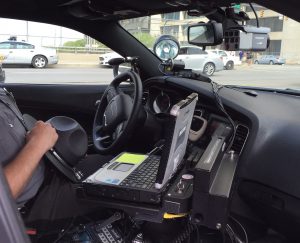 A smartphone app for breath-alcohol-testing was so promising that all five investors on Shark Tank collaborated on a deal for the first time. In 2013, Charles Yim went on the show and pitched his app to the Sharks. The Sharks collectively invested $1 million in Yim’s company Breathometer, Inc. for 30% of the company’s equity. Three years later, the company was the subject of an FTC complaint, and the complaint was recently settled.
A smartphone app for breath-alcohol-testing was so promising that all five investors on Shark Tank collaborated on a deal for the first time. In 2013, Charles Yim went on the show and pitched his app to the Sharks. The Sharks collectively invested $1 million in Yim’s company Breathometer, Inc. for 30% of the company’s equity. Three years later, the company was the subject of an FTC complaint, and the complaint was recently settled.
Articles Posted in DUI/OVI laws and cases
Ohio Supreme Court Paves Prosecution’s Path For Drugged Driving Convictions
 Bad Facts Make Bad Law
Bad Facts Make Bad Law
If a police officer says a driver was under the influence of a drug, there is no need for testimony from an expert regarding whether the drug actually impairs driving. That is, essentially, the conclusion of the Ohio Supreme Court’s decision in State v. Richardson. There is a saying among lawyers: “bad facts make bad law”. The precedent created by this case may qualify as ‘bad law’, and the circumstances of the case definitely qualifiy as ‘bad facts’. Continue Reading
Ohio Supreme Court: Cruiser Videos Are Public Records
When a cel ebrity is accused of DUI/OVI in Ohio, the celebrity’s cruiser video is often on the local news the next day. News outlets obtain cruiser videos by making public records requests with the arresting law enforcement agency. Those public records requests are routinely processed quickly. Sometimes, however, law enforcement agencies decline or delay release of the public records. A recent case decided by the Ohio Supreme Court addresses the details of releasing cruiser videos as public records.
ebrity is accused of DUI/OVI in Ohio, the celebrity’s cruiser video is often on the local news the next day. News outlets obtain cruiser videos by making public records requests with the arresting law enforcement agency. Those public records requests are routinely processed quickly. Sometimes, however, law enforcement agencies decline or delay release of the public records. A recent case decided by the Ohio Supreme Court addresses the details of releasing cruiser videos as public records.
Should A DUI / OVI As A Juvenile Enhance A Later DUI / OVI As An Adult?
In Ohio DUI / OVI cases, mandatory minimum penalties are increased based on prior OVI convictions. One issue faced by Ohio courts is whether a person’s OVI adjudication (‘conviction’) as a juvenile can be used to enhance a subsequent OVI sentence as an adult. The Ohio Supreme Court recently issued an opinion which settles the issue.
Change To Ohio DUI/OVI Law Expands Driving Privileges
Until a few days ago, the scope of driving privileges for Ohio DUI/OVI suspensions was very limited. A parent on limited driving privileges was not permitted to drive children for extra-curricular activities. A person on limited driving privileges was not allowed to drive to care for elderly parents. A person on limited driving privileges could not drive to AA or counseling unless it was court-ordered. That changed last week, when the state legislature revised Ohio law for limited driving privileges.
Ohio Administrative License Suspensions-Lesson #2
 The last entry in this blog discussed lesson number one for appealing an Ohio Administrative License Suspension (A.L.S.). The lesson came from a recent appellate case. That lesson was for defense lawyers, and it was simple: file the appeal on time. This entry discusses lesson number two, which also comes from a recent appellate case. This lesson is for courts, and it is also simple: follow the law.
The last entry in this blog discussed lesson number one for appealing an Ohio Administrative License Suspension (A.L.S.). The lesson came from a recent appellate case. That lesson was for defense lawyers, and it was simple: file the appeal on time. This entry discusses lesson number two, which also comes from a recent appellate case. This lesson is for courts, and it is also simple: follow the law.
Weakening Of Exclusionary Rule Could Affect Ohio DUI/OVI Cases
 At some point, the exception becomes the rule. To discourage police from violating individual rights, we developed the exclusionary rule. If evidence is obtained as a result of an unreasonable search or seizure, or other Constitutional violation, the evidence is excluded from trial. That’s the general rule. Courts, however, have created exceptions to this rule. One exception to the exclusionary rule was the subject of a recent case before the United States Supreme Court. The outcome of that case could affect DUI/OVI cases in Ohio.
At some point, the exception becomes the rule. To discourage police from violating individual rights, we developed the exclusionary rule. If evidence is obtained as a result of an unreasonable search or seizure, or other Constitutional violation, the evidence is excluded from trial. That’s the general rule. Courts, however, have created exceptions to this rule. One exception to the exclusionary rule was the subject of a recent case before the United States Supreme Court. The outcome of that case could affect DUI/OVI cases in Ohio.
U.S. Supreme Court Decides Constitutionality Of Warrantless Blood Tests And Breath Tests In DUI Cases
 Last week, the United States Supreme Court released a decision in a trio of cases involving DUI refusal laws. A previous article in this blog gives a preview of the cases. To decide the outcomes of those cases, the court analyzes whether search warrants are required before law enforcement officers can administer breath tests and blood tests. Based on that analysis, the Court decides whether states can make it illegal to refuse chemical tests in DUI cases. The Court’s decision will impact Ohio DUI/OVI cases.
Last week, the United States Supreme Court released a decision in a trio of cases involving DUI refusal laws. A previous article in this blog gives a preview of the cases. To decide the outcomes of those cases, the court analyzes whether search warrants are required before law enforcement officers can administer breath tests and blood tests. Based on that analysis, the Court decides whether states can make it illegal to refuse chemical tests in DUI cases. The Court’s decision will impact Ohio DUI/OVI cases.
Ohio Drugged Driving Law: Must Be Nexus Between Drug And Driving Impairment
 The only presumption permitted in an Ohio DUI/OVI trial is the presumption the defendant is not guilty. In a case alleging drugged driving, the prosecution must prove the defendant ingested a drug, and the prosecution must prove the defendant’s ability to drive was impaired. Finally, as a recent case illustrates, the prosecution must prove causation: the impaired driving ability was caused by ingesting the drug.
The only presumption permitted in an Ohio DUI/OVI trial is the presumption the defendant is not guilty. In a case alleging drugged driving, the prosecution must prove the defendant ingested a drug, and the prosecution must prove the defendant’s ability to drive was impaired. Finally, as a recent case illustrates, the prosecution must prove causation: the impaired driving ability was caused by ingesting the drug.
False Arrest Claims – Your Options After The DUI/OVI Case Is Over
 I have recently had the privilege of working on OVI cases with attorney Eric Holloway. In addition to OVI defense, Eric also represents clients in civil rights cases, including cases involving false arrest. As a follow-up to the last blog entry, ‘Uncovering False Arrests In DUI/OVI Cases’, I asked Eric to summarize the options of a person falsely arrested for OVI. Eric agreed to be a guest blogger and prepared the remainder of this article.
I have recently had the privilege of working on OVI cases with attorney Eric Holloway. In addition to OVI defense, Eric also represents clients in civil rights cases, including cases involving false arrest. As a follow-up to the last blog entry, ‘Uncovering False Arrests In DUI/OVI Cases’, I asked Eric to summarize the options of a person falsely arrested for OVI. Eric agreed to be a guest blogger and prepared the remainder of this article.
 Columbus OVI/DUI Attorney Blog
Columbus OVI/DUI Attorney Blog



